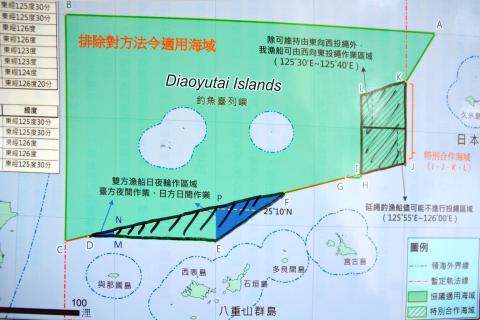The Ministry of Foreign Affairs (MOFA) yesterday pledged to safeguard Taiwanese fishermen’s interests at an upcoming meeting with Japan, amid demands by Japanese fishery associations that the boundaries set by a historic agreement between the two nations be narrowed.
“Regarding Okinawa fishery associations’ demands that Japanese authorities re-examine the areas in which the 2013 Taiwan-Japan fishery agreement are applicable, the Japanese government has yet to include the issue on the agenda of the fifth meeting of the Taiwan-Japan fishing commission from March 2 to March 4 in Taipei,” ministry spokesperson Eleanor Wang (王珮玲) said.
Wang said that if Japan brings up the issue during the meeting, Taiwan’s representatives would argue strongly for the nation’s interests and ask their Japanese counterparts to consider the achievements that have been made since the agreement’s signing.

Photo: Chu Tse-wei, Taipei Times
“At the moment, such demands are made only by local fishery groups in Japan and do not reflect the nation’s official stance,” Wang said, urging concerned parties to handle the matter in a rational manner.
Wang made the remarks one day after representatives of the Yilan-based Suao Fishermen’s Association and other fishery groups urged the government to stand up for their rights during the meeting, or they would mobilize fishermen to surround the disputed Diaoyutai Islands (釣魚台) as a form of protest.
The Taiwan-Japan fishing commission was established after the two nations in April 2013 signed a pact on fishing rights in the East China Sea near the Diaoyutais, which Japan calls the Senkaku Islands.
Under the terms of the agreement, Taiwanese and Japanese boats can operate freely in a 74,300km2 area around the archipelago.
An amendment to the pact was passed last year, allowing Taiwanese and Japanese fishing boats to take turns operating in the area north of the Yaeyama Islands and maintain a 4 nautical mile (7.4km) distance between each boat while fishing.
Wang said the agreement has established an institutionalized negotiation mechanism between Taipei and Tokyo, allowing both sides to jointly explore fishery resources and their fishermen to operate in peace.
“It is a concrete embodiment of [President Ma Ying-jeou’s (馬英九)] East China Sea peace initiative and has set a successful precedent for peaceful resolution of conflicts,” Wang said.

Right-wing political scientist Laura Fernandez on Sunday won Costa Rica’s presidential election by a landslide, after promising to crack down on rising violence linked to the cocaine trade. Fernandez’s nearest rival, economist Alvaro Ramos, conceded defeat as results showed the ruling party far exceeding the threshold of 40 percent needed to avoid a runoff. With 94 percent of polling stations counted, the political heir of outgoing Costa Rican President Rodrigo Chaves had captured 48.3 percent of the vote compared with Ramos’ 33.4 percent, the Supreme Electoral Tribunal said. As soon as the first results were announced, members of Fernandez’s Sovereign People’s Party

EMERGING FIELDS: The Chinese president said that the two countries would explore cooperation in green technology, the digital economy and artificial intelligence Chinese President Xi Jinping (習近平) yesterday called for an “equal and orderly multipolar world” in the face of “unilateral bullying,” in an apparent jab at the US. Xi was speaking during talks in Beijing with Uruguayan President Yamandu Orsi, the first South American leader to visit China since US special forces captured then-Venezuelan president Nicolas Maduro last month — an operation that Beijing condemned as a violation of sovereignty. Orsi follows a slew of leaders to have visited China seeking to boost ties with the world’s second-largest economy to hedge against US President Donald Trump’s increasingly unpredictable administration. “The international situation is fraught

MORE RESPONSIBILITY: Draftees would be expected to fight alongside professional soldiers, likely requiring the transformation of some training brigades into combat units The armed forces are to start incorporating new conscripts into combined arms brigades this year to enhance combat readiness, the Executive Yuan’s latest policy report said. The new policy would affect Taiwanese men entering the military for their compulsory service, which was extended to one year under reforms by then-president Tsai Ing-wen (蔡英文) in 2022. The conscripts would be trained to operate machine guns, uncrewed aerial vehicles, anti-tank guided missile launchers and Stinger air defense systems, the report said, adding that the basic training would be lengthened to eight weeks. After basic training, conscripts would be sorted into infantry battalions that would take

GROWING AMBITIONS: The scale and tempo of the operations show that the Strait has become the core theater for China to expand its security interests, the report said Chinese military aircraft incursions around Taiwan have surged nearly 15-fold over the past five years, according to a report released yesterday by the Democratic Progressive Party’s (DPP) Department of China Affairs. Sorties in the Taiwan Strait were previously irregular, totaling 380 in 2020, but have since evolved into routine operations, the report showed. “This demonstrates that the Taiwan Strait has become both the starting point and testing ground for Beijing’s expansionist ambitions,” it said. Driven by military expansionism, China is systematically pursuing actions aimed at altering the regional “status quo,” the department said, adding that Taiwan represents the most critical link in China’s